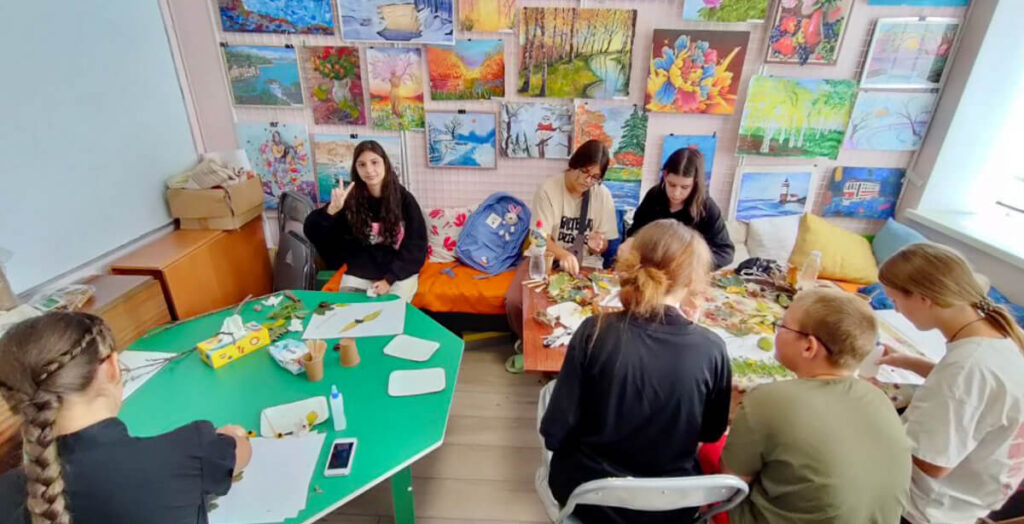“I’ve been having a hard time containing my anger and irritation lately,” says 18-year-old Olena. In addition to dealing with the typical challenges of teenagerhood—school anxieties, sibling conflicts and worries about her future—she’s also dealing with the stresses of daily life during a war.
Olena lives in Odesa, Ukraine’s third-largest city. Over the past three years, Russian missile and drone strikes have killed or wounded hundreds of civilians, wrecking homes, infrastructure and cultural sites in the process. Her family is safe—for now. However, for Olena and millions of Ukrainians around the country, the experience has taken a mental toll.
“There is no Ukrainian—in the country or out of it—who has not been affected by the war,” explains Yuliia Okhmat, Deputy Mental Health and Psychosocial Support (MHPSS) Coordinator for International Medical Corps in Ukraine. “Each of us lost the life we had before, and each of us has had to adjust—not only to practical things like air-raid alerts, but also to the anxieties and uncertainties about the future. Mental health in Ukraine is an acute issue.”
The World Health Organization estimates that 9.6 million people in Ukraine are now either living with or at risk of a mental health condition. In the first half of 2024, the number of people who spoke to their doctors about mental health complaints doubled from 2023, according to the country’s Health Ministry. Common symptoms included feelings of anxiety and tension, sleep problems and low mood.
To address the growing mental health crisis, International Medical Corps provides MHPSS services, gives psychological first aid to people displaced by the conflict, provides counselling and case management services, and trains Ukrainian health and social workers in MHPSS skills. Our teams also run psychosocial support sessions using arts-and-crafts activities for people of all ages around the country, partnering with local organisations to identify opportunities and tailor programmes to communities’ requirements.
In Odesa, we collaborated with a local NGO that supports teenagers like Olena. Our MHPSS workers ran an art workshop on the theme of “the colours of autumn,” which helped the teenagers create art using materials collected outside. During the session, the team encouraged discussions about the season and its association with shortening days and a return to school and exams—all of which can affect teens’ moods.
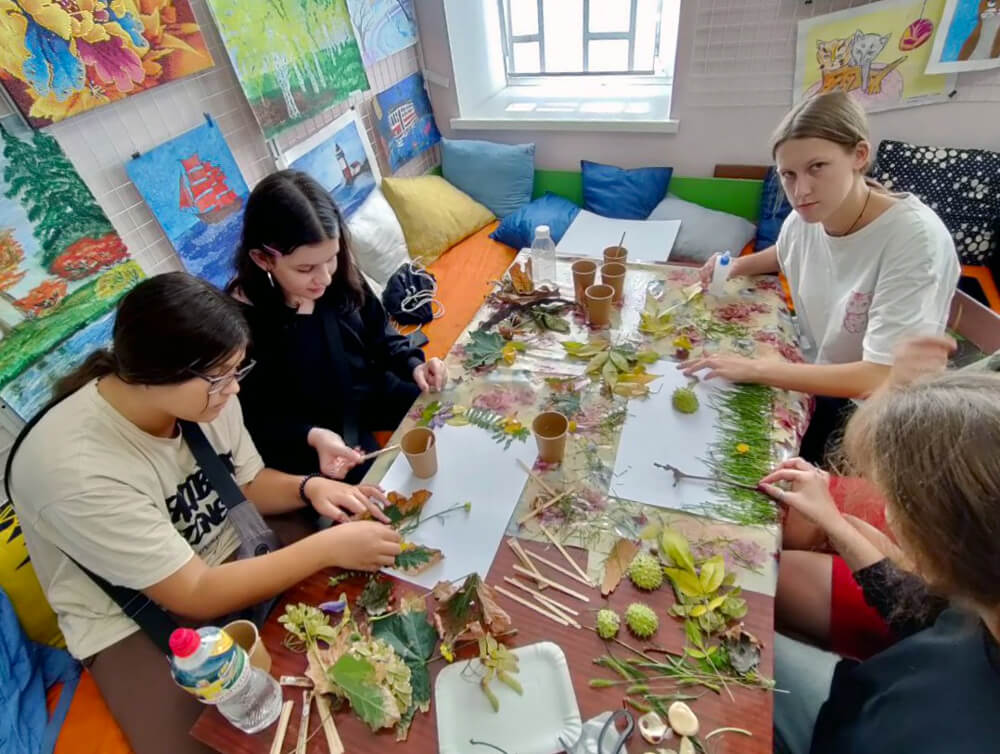
Initially, Olena and her peers were shy and hesitant in the workshop. However, with the guidance of the MHPSS team, they gradually opened up and engaged in the activity and the group discussion. As they worked on their autumnal artworks, they reflected on the difficulties they were experiencing at home and school. Afterward, they reported feeling more relaxed.
“I didn’t realize that working with natural materials could be so calming. It was interesting to communicate with others and make something with my own hands,” Olena says.
Though some Ukrainians benefit from the specialised interventions that International Medical Corps provides—such as psychological first aid, group and individual counselling sessions or referrals to psychiatrists—for many others, psychosocial support sessions in the form of group art workshops can make a big difference.
“Art-based psychosocial support sessions are helpful for people in Ukraine, as they help reduce stress and provide a safe, non-verbal way to process the challenging events they have been going through,” says Okhmat.
“These sessions are all about emotional expression, strengthening resilience and promoting social connection, which is vital for individuals affected by war, loss and displacement.”
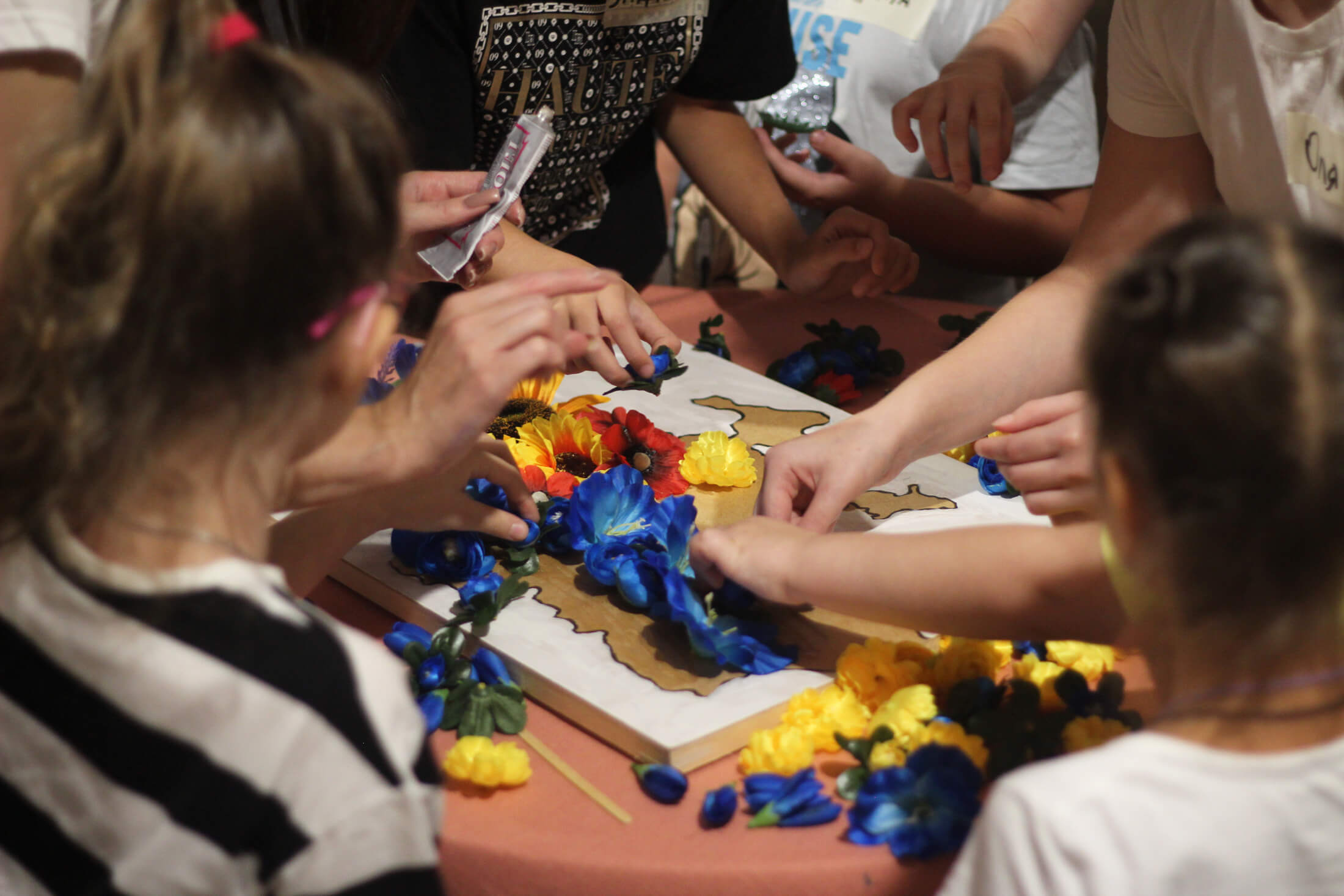
International Medical Corps’ MHPSS teams around the country also run sessions for younger children—including those displaced by the conflict. For example, many families from Bahkmut, now occupied by Russian forces, have settled in Kharkiv in northeastern Ukraine. International Medical Corps partners with a local hub named “With Bakhmut in My Heart,” where the former residents of Bakhmut meet to socialise and access support.
Recently, we organised art-based psychosocial support activities for children between the ages of 6 and 10, including a collaborative project that involved decorating a map of Ukraine with flowers in the blue and yellow colours of the national flag.
“Our teams incorporate cultural elements in art that help reconnect participants with their heritage,” explains Ohkmat. “It helps them maintain a sense of identity and continuity amid upheaval.”
For the Bakhmut children, decorating a map was an opportunity to bond over their shared experience of displacement within their country. The MHPSS workers were there to help them express their feelings. At the end, they gave each child a book about emotions, as well as colouring books, crayons and pencils to continue their creative projects at home.
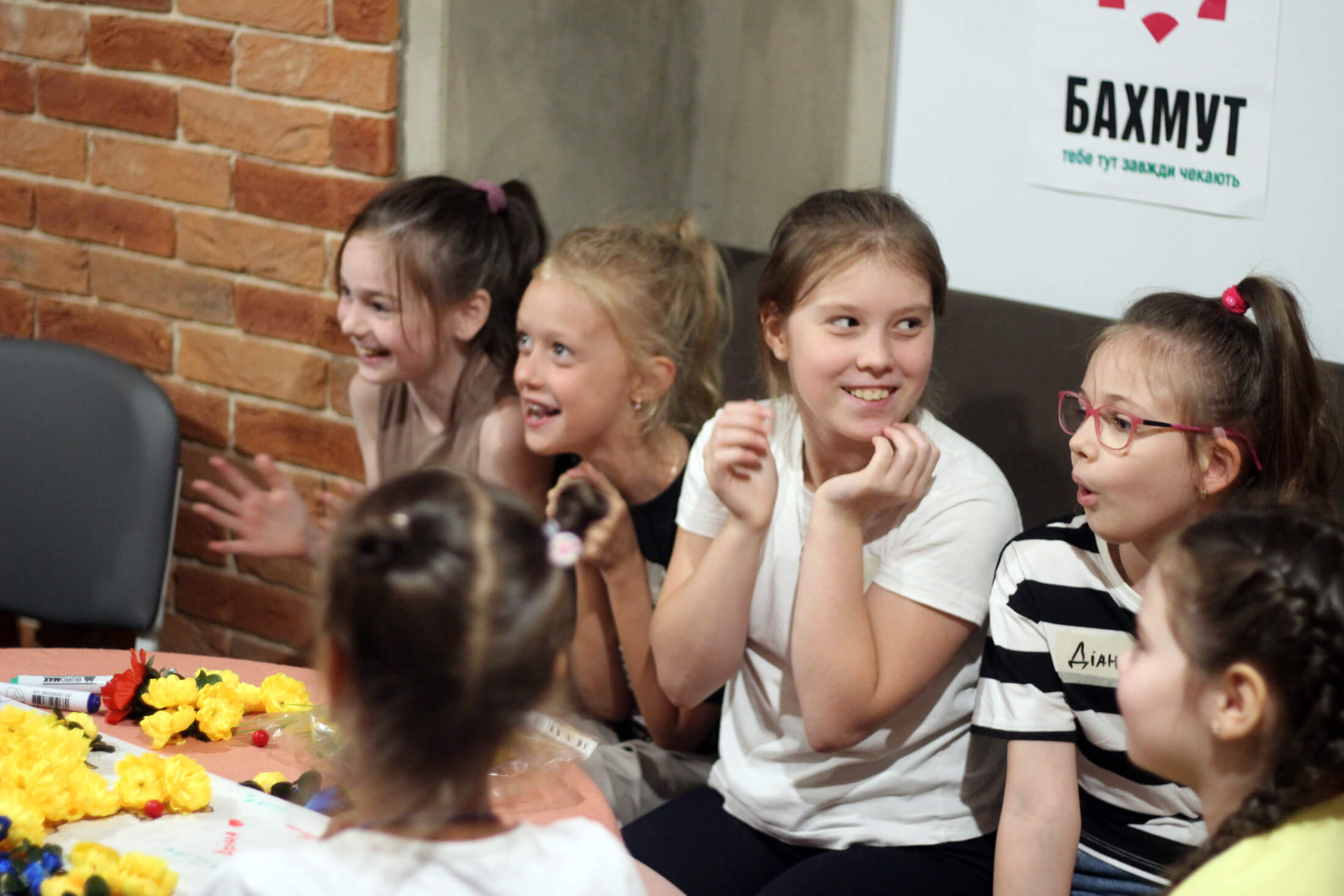
Adults can benefit from this type of support, too—especially those living near the front lines, and those who care for others. The schoolteachers in the village of Sofiivska, Mykolaivska oblast, fall into both of those categories. Stressed, busy and under pressure to provide attention and stability to their students, these teachers have little time to focus on their own well-being.
International Medical Corps frequently conducts psychosocial support sessions and mental health training workshops for teachers and for health and social workers near Ukraine’s front lines. At one session for the Sofiivska village schoolteachers, the MHPSS team introduced a new project: origami.
At first, some of the teachers were reluctant—amid their stresses and heavy workloads, they doubted that the paper-folding workshop could help them. However, they soon found that the project helped them slow down, de-stress and speak more openly to their colleagues about their troubles. In the end, some teachers chose to keep their origami art as a reminder of the importance of taking care of their own emotional well-being. Others decided to present their creation to their students or colleagues as a symbol of mutual support.
“In our busy work, it is rarely possible to find time for myself,” says Tetyana Vasylivna, the school’s director. “But today, I felt how creativity through origami helps me to relax, calm my thoughts and find inner balance. This session not only filled me with energy but also gave me a feeling of support and care from the people around me.”
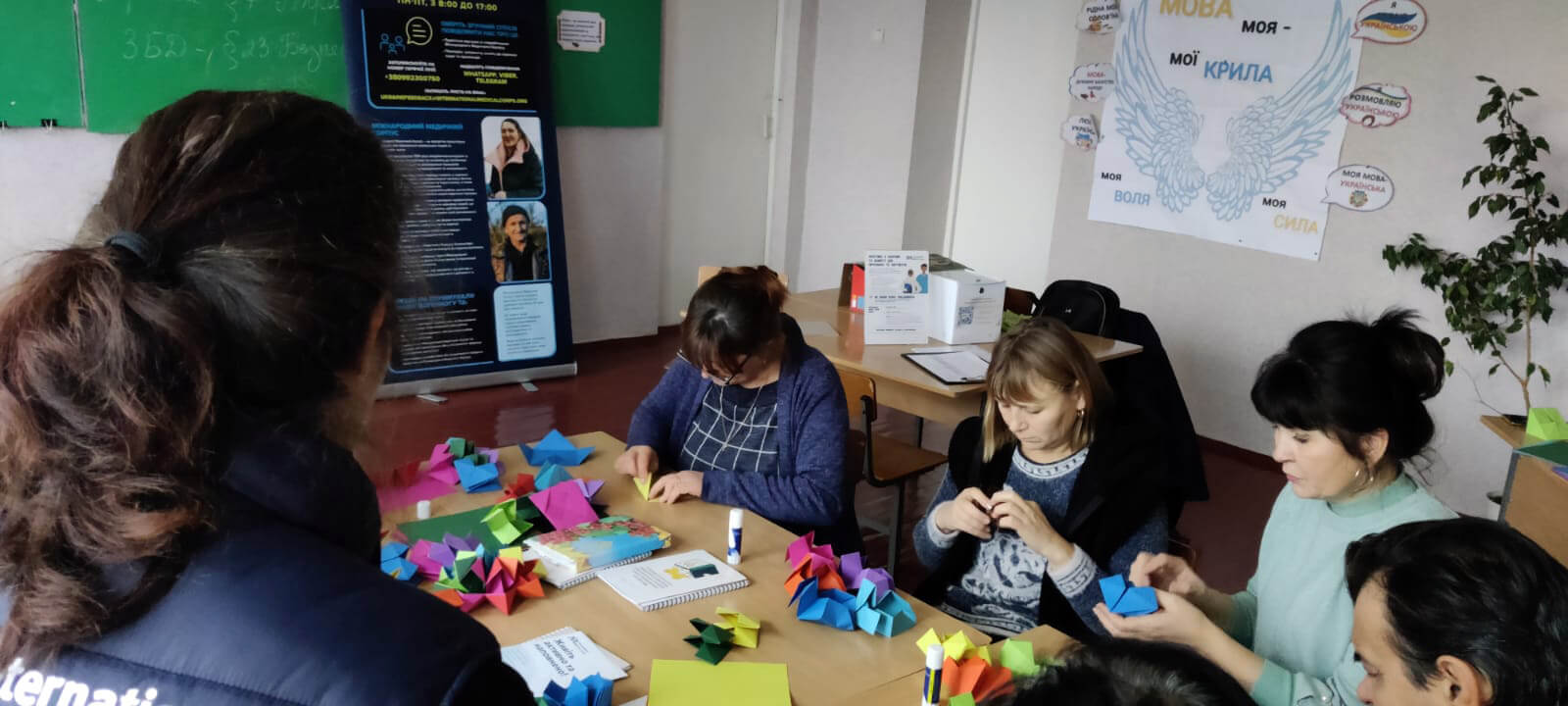
In addition to providing on-the-ground MHPSS services to respond to Ukrainians’ immediate needs, International Medical Corps is co-leading the country’s MHPSS technical working group, advising on national mental health policy and working to strengthen the country’s wider healthcare system.
To help us continue bringing humanitarian assistance to people in Ukraine—and around the world—donate to International Medical Corps today.
